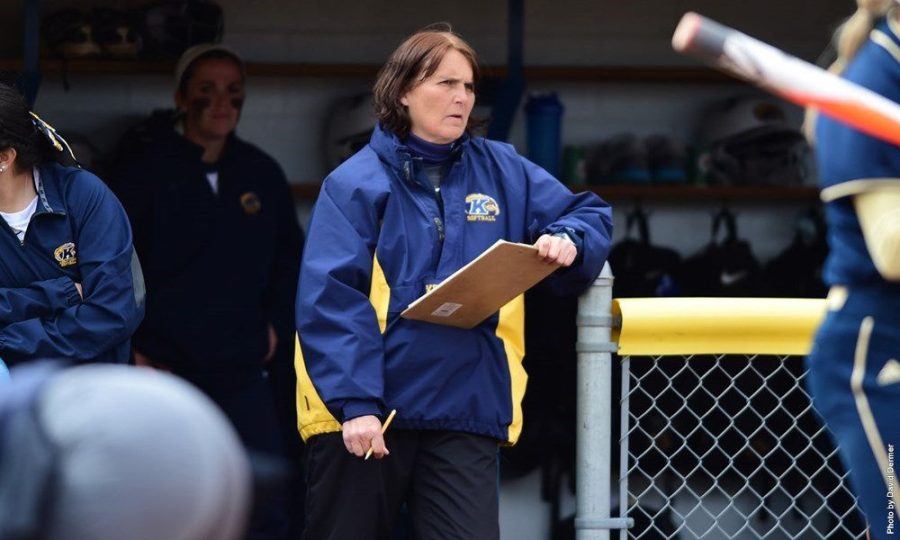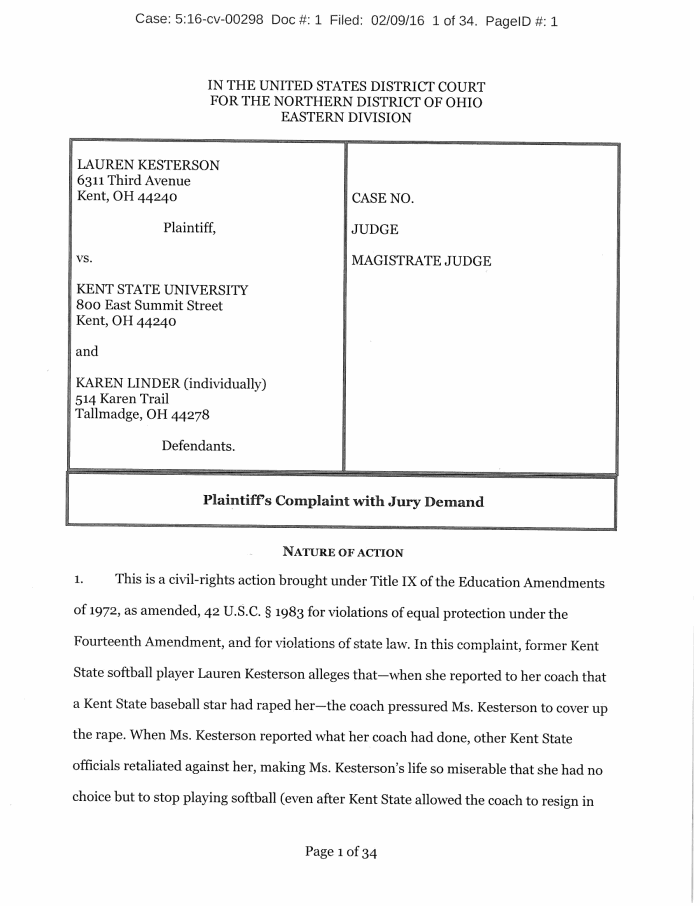Former Kent State softball player files lawsuit against university for alleged rape cover-up
Former Kent State softball player Lauren Kesterson filed a lawsuit Tuesday against Kent State and former softball coach Karen Linder, alleging Kesterson was raped by Linder’s son, a then-varsity baseball player, and athletic department officials covered up the alleged incident.
The suit, filed in the U.S. District Court, charges the university and Karen Linder as violating Title IX of the Education Amendments of 1972, which prohibits discrimination on the basis of sex in any federally funded education program or activity.
Former Kent State softball player files lawsuit against university for alleged rape cover-up from KentWired.com on Vimeo.
The suit also alleges university staff members, including Athletic Director Joel Nielsen, knew of the rape and failed to follow university policy in investigating the allegation.
The lawsuit further claims Kesterson reported her coach’s cover up to former Deputy Title IX coordinator Erin Barton. The lawsuit says Barton explained she had spoken to and met with Nielsen, who had “intervened and prevented the filing of a formal complaint.”
Kesterson also alleges Karen Linder pressured her not to report the incident.
The university responded to the allegations, saying, “When we are formally served with the complaint, we will answer accordingly. The University is strongly committed to title IX, and we take these matters very seriously. We follow all policies and procedures related to title IX, taking measures above and beyond what is required to ensure all students, staff, and faculty are aware of their rights and responsibilities,” said university spokesman Eric Mansfield.
Both Kent State’s athletic department and Jennifer O’Connell, director of Kent State’s Sexual and Relationship Violence Support Services, referred to Mansfield for comment on the lawsuit.
Subodh Chandra, a Cleveland-area attorney representing Lauren Kesterson, said Kesterson first came to his office last fall.
“Everyone in our office (whom she) spoke with was deeply concerned and saddened by what she experienced,” Chandra said.
Chandra said his office reached out to the university’s Office of General Counsel in an attempt to resolve the matter, but the university refused.
He also said he requested a meeting with Kent State’s Board of Trustees Chairman Dennis Eckart, but has not received a response.
“Around this country, there has been a virtual epidemic of similar instances of higher educational institutions failing to follow Title IX or honor the equal protection clause, and Kent State is Ms. Kesterson’s institution, and she believes it should be held accountable,” Chandra said. “Not only to protect herself, but to protect others.”
In the suit, Kesterson alleges Tucker Linder, Karen Linder’s son and a a freshman baseball player at the time of the alleged incident, raped her during the fall of their freshman year at Kent State. The suit says “they had developed a friendship” and “had engaged in minor intimacies” during the fall semester before the alleged incident.
The incident allegedly happened Dec. 7, 2012, when Tucker Linder called Kesterson and asked her to meet him at his dorm, and they walked back to her dorm. The suit alleges Tucker Linder appeared to be intoxicated and Kesterson had not been drinking.
They again “engaged in minor intimacies” and Kesterson “consented to this behavior.” However, the suit says that Tucker Linder pressured her to have sex and “unlike during their previous encounter, Mr. Linder did not stop when Ms. Kesterson stopped consenting.”
The suit also says Kesterson told Tucker Linder, who was 6’5” and 210 pounds at the time, “at least ten times” that she didn’t want to have sex and unsuccessfully tried to push him away. Tucker Linder ignored her, the suit alleges, and raped her.
According to section 5-16.2 of the University Policy Register, consent is defined as “the voluntary, unambiguous agreement to participate in an act, the nature of which is known to and understood by the consenter. Consent may be given verbally or nonverbally and may be withdrawn at any time before completion of the act.”
The suit says Kesterson didn’t report it to the police because she was “fearful of what pressuring charges against her coach’s son would mean for her opportunity to play softball.”
Kesterson “tried her best to move past it on her own,” the suit says, but she struggled to attend classes and struggled at softball practice because the baseball and softball teams practice in close proximity.
“Being around softball meant being around her rapist,” the suit said.
Kesterson and her boyfriend went to a party Tucker Linder also attended in September 2013. Linder, who was intoxicated, told Kesterson’s boyfriend, “Just so you know: I f-ed your girl,” according to the lawsuit.
This encounter led to her reliving the alleged incident, causing nightmares and flashbacks.
Kesterson began confiding in her friends and parents around September 2013.
In mid-May 2014, Karen Linder asked Kesterson at an end-of-season exit interview if she had been sexually assaulted. Karen Linder asked Kesterson, “It wasn’t my son, was it?”
The suit says Kesterson hesitated to answer, fearing that she’d lose her opportunity to participate in the program.
The suit says when Kesterson did acknowledge Tucker Linder was the alleged rapist, Karen Linder began crying and apologized.
The suit states Karen Linder asked who else knew of the alleged claim and said, “I would appreciate if you would not tell anybody else.”
The suit said Kesterson felt she had to remain silent in order to stay on the team.
Karen Linder told Kesteron her son was struggling and said she “would handle this and do whatever she could to help,” according to the lawsuit.
Linder reported a rape of another softball player days before Kesterson came to her to tell her about her own alleged incident. In this case, the suit alleges Karen Linder followed proper reporting procedure, including escorting the student to the university’s Office of Sexual and Relationship Violence Support Services and reporting the incident to Janet Kittell, senior women’s administrator and a deputy Title IX coordinator.
“Coach Linder knew exactly how to handle a rape allegation,” the lawsuit says. “She just chose to ignore the policy and the law in Ms. Kesterson’s case.”
Karen Linder never mentioned the alleged rape of Kesterson again and “generally acted with extreme indifference toward Kesterson throughout the 2014-15 academic year,” according to the suit.
In spring 2015, Karen Linder moved Kesterson from shortstop, her preferred position where she had played for the past two seasons, to second base.
According to the suit, Kesterson became emotional during practice one day. Karen Linder told her, “I hope you understand that you can’t act like that in a practice or game setting.”
The suit says on or about Aug. 24, 2015, Kesterson filed a Title IX complaint against Linder for failing to report the complaint. Kesterson met with Barton, the deputy coordinator for Title IX in the Equal Opportunity and Affirmative Action Department responsible for conducting interviews regarding the Title IX complaint.
The Title IX coordinator is responsible for overseeing the implementation of Title IX regulations and any Title IX-related investigations, according to section 5-16.2 of the University Policy Register.
The suit says during their meeting, Barton said, “We are going to make this right,” and would file a formal complaint and non-contact orders against Karen Linder and Tucker Linder.
Barton said once she filed the formal complaint against Karen Linder, Nielsen and those ranking above him in the university administration would receive a copy of the complaint.
However, the next day Barton said no complaint would be filed because Nielsen had “intervened to prevent the filing of a formal complaint,” according to the suit.
Instead, Barton and Nielsen would conduct a “surprise interview” with Karen Linder.
The suit states Kesterson got the impression from Barton that Nielsen’s motivation was to keep the matter as quiet as possible and prevent informing his superiors about what had happened under his watch.
Three days later, Karen Linder resigned. In an interview with the Record-Courier, she said it was time for her to “move in another direction because the world of athletics has changed.”
“When I first started coaching kids wanted to play, and they looked at you as a leader,” she said in the interview. “If you told kids to do something, they would do it because they trusted that it was going to help them get better. Now when you tell a kid to do something, some of them need three reasons why they need to do it this way. It’s a world of entitlement, and I’ve struggled with that.”
Kesterson believed Karen Linder blamed her for the resignation, according to the suit.
The suit said “a climate of hostility” existed toward Kesterson from teammates and others close to the softball program. Interim coach Eric Oakley told the team, “Anyone who said anything bad about Coach Linder would be off the team. He emphasized that there would be ‘no warnings given.’ ”
The suit also said Oakley was aware of Kesterson’s complaint, although it was supposed to be a confidential complaint.
According to the suit, O’Connell, Kesterson’s assigned Title IX advocate and director of the university’s SRVSS office, confirmed Oakley was aware of Kesterson’s report.
According to the suit, Kesterson attempted to set up a meeting with her Title IX coordinator, Loretta Shields, but was denied.
“Ms. O’Connell told Ms. Kesterson that Ms. Shields could not help Ms. Kesterson and would not meet with her,” the suit says.
In early September 2015, Kesterson met with Nielsen about Oakley being aware of her complaint and asked Nielsen to assure that Tucker Linder would remain off campus.
According to the suit, “Mr. Nielsen said that Kent State would not take any steps to prevent Ms. Kesterson’s rapist from coming on to campus.”
Kesterson, and her twin sister, Chloe, who was also a softball player, decided to leave the team at that point.
According to the lawsuit, Karen Linder continued to spend time with the team and use facilities for privates lessons throughout the fall 2015 season.
The lawsuit says Kesterson is suing for full compensatory damages, both economic and non-economic, including “damages for pain and suffering, mental anguish, emotional distress, humiliation, and inconvenience that Ms. Kesterson has suffered and is reasonably certain to suffer in the future,” and punitive damages, along with attorneys’ fees.
Mansfield, the university spokesperson, said it has not yet received a copy of the lawsuit.
Ty Sugick contributed reporting.




